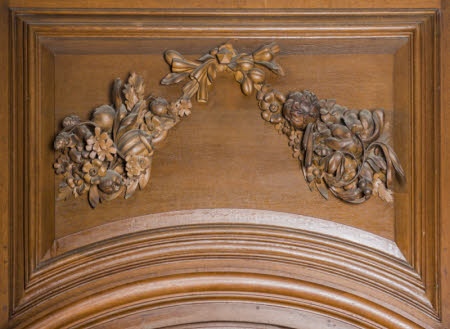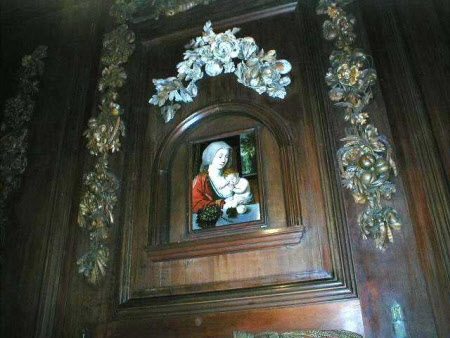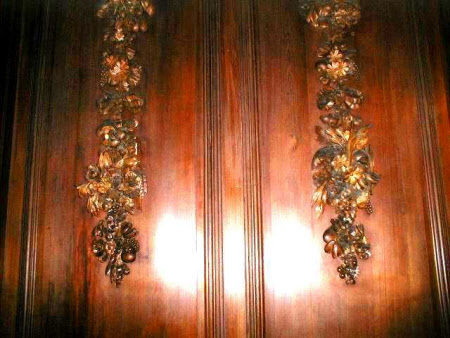Overmantel with cornucopia, fruit, flowers and foliage
style of Grinling Gibbons (Rotterdam 1648 - London 1721)
Category
Art / Sculpture
Date
circa 1688
Materials
Limewood
Measurements
2000 mm (H); 1500 mm (W)
Place of origin
England
Order this imageCollection
Belton House, Lincolnshire
NT 436757.3
Summary
Limewood, carved applique overmantel with cornucopia, flowers, fruit, foliage and ribbon ties, late 17th century with 19th century restorations. An overmantel in the style of Grinling Gibbons (1648-1721), comprised of two drops and a cresting piece of twin cornucopia and swags of shamrock.
Full description
Although there is no archival evidence to date or attribute the overmantel, it was probably produced by regional wood carvers working in the Gibbons' style and installed around 1688 when the house was first being furnished for 'Young' Sir John Brownlow (1659-97). An engraving of the overmantel was published in The Art-Journal, 1856, accompanying an article which publicised the restoration of the 17th century woodcarvings at Belton House by William Gibbs Rogers (1792-1875). Rogers, a wood carver and restorer, was the leading expert on carvings by or in the style of Grinling Gibbons (1648-1721). In this article the overmantel is taken to be by Gibbons, however later scholars, such as David Green, believe it to be by regional craftsmen (Green 1964, p.115). Described as a scheme more fitting of a dining room than Chapel, twin cornucopia, 'emblems of festivity', are bound together with bunches of flowers and crossed palm branches (The Art-Journal, 1856, vol.II, p.85). Swags of buttercups unite the cornucopia to drops at left and right, hanging from ribbon ties. These 'consist of a profusion of finely formed fruit, corn, hops, and wild flowers'. (ibid). Roses, martagon, poppies, lilies, wheat, fleshy plums, plump peaches and intricate peapods can all be seen. Alice Rylance-Watson December 2018
Provenance
Purchased with a grant from the National Heritage Memorial Fund (NHMF) from Edward John Peregrine Cust, 7th Baron Brownlow, C. St J. (b.1936) in 1984.
Credit line
Belton House, The Brownlow Collection (acquired with the help of the National Heritage Memorial Fund by the National Trust in 1994)
Makers and roles
style of Grinling Gibbons (Rotterdam 1648 - London 1721), woodcarver
References
Green 1964: David Green, Grinling Gibbons: His work as carver and statuary 1648-1721, London 1964, p.115 The Art-Journal, London, 1856, vol.II, p.85 Tipping, 1913: Henry Avray Tipping, Grinling Gibbons and the Woodwork of his Age 1648-1720, 1913, pp.185-201


